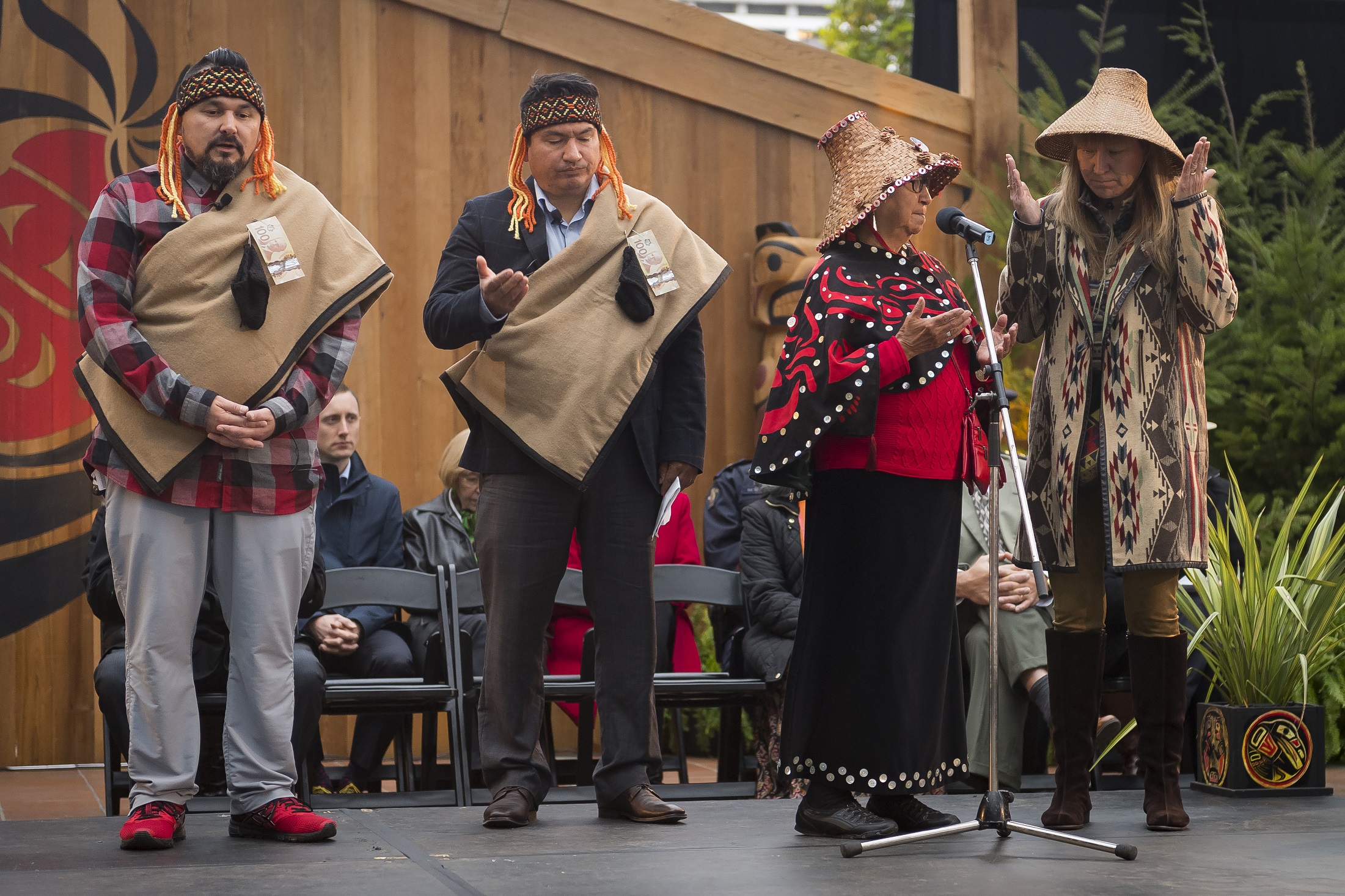Simon Fraser University has 33 steps to take towards reconciliation, and after a witnessing ceremony at the Burnaby campus Monday, many will be watching to ensure it’s not an empty gesture.
Last month British Columbia’s second largest university released Walk This Path With Us, the report from SFU’s Aboriginal reconciliation council outlining 33 calls to action for SFU to work towards reconciliation.
Monday’s witnessing ceremony followed Coast Salish protocol where “rather than writing something down on a piece of paper or documenting it, you would call on a number of witnesses to be the messengers and report back out to the broader community and to communities who could not attend,” said Chris Syeta’xtn Lewis, co-chair of the Aboriginal reconciliation council and a Squamish Nation councillor.
Witnesses came from local First Nations — SFU’s three campuses sit on Musqueam, Squamish, Katzie, Kwikwetlem and Tsleil-Waututh land — the Indigenous student body and the university administration. Holding the ceremony was part of the council’s mandate, Lewis said.
Inspired by the national Truth and Reconciliation Commission’s 94 Calls to Action released in 2015, SFU announced in 2016 the university’s goals would be aligned with those calls. Setting aside $9 million at the time for what it called the Aboriginal Strategic Initiative, the council was formed to direct how the money should be spent.
Over the past year the council, composed of Indigenous and non-Indigenous students, faculty, and staff, held half a dozen public forums and meetings to solicit ideas on furthering reconciliation at SFU.
Over 400 people participated, helping shape the 33 calls to action in the report that range in scale from small, like signs in the languages of the five Coast Salish nations whose territory SFU rests on, to “big hairy audacious goals” like creating an institute for Indigenous dialogue, governance and empowerment.
“One of the first things that came out of our engagement with Indigenous communities is whatever comes out of this work, however you give the work back to the university, it should be done according to our protocols and traditions,” Lewis said.
Lewis, who attended the university from 2002 to 2005, says a lack of recognition of Indigenous culture, languages and history in the region meant he separated his education from his Squamish culture. He felt he had to wait until he returned to his community to immerse himself back into his culture.
SFU has made great strides towards reconciliation since then, but there is still a long way to go, he said.
“Some students [today] actually feel like they have to defend the Indigenous perspective, because folks don’t understand what has transpired,” he said.
“If you can provide [education and culture] to Indigenous and non-Indigenous people at the same time, then we’re creating more wholesome First Nations leaders, individuals that are more educated on First Nations history and the tragedies that have happened to our people. So when we speak out against something, they understand why.”
Both the council and university administration heard from the Indigenous community that there should be “nothing about us without us.” Education dean and council co-chair Kris Magnusson says the university has already adopted this mantra.
“I’ve heard at the senior executive, an issue will come up and they’ll ask, what would the idea of ‘nothing about us without us’ look like in this situation?” Magnusson said.
“It’s really changed the consciousness and the dialogue, and I think that in itself may be one of the most enduring legacies. As people start to think differently, they’ll act differently, and create opportunities that perhaps none of us thought of.”
SFU plans to use some of the $9 million to help leverage more funding for the proposed institute and a ceremonial longhouse on one of the campuses.
But Magnusson says the money will more than cover smaller steps like offering developmental grants for educators to indigenize their curriculum, ensuring every SFU graduate leaves with a comprehensive understanding of the people whose land they’re learning on, and expanding support for Indigenous students.
“If anywhere near the population of Indigenous students started to use the [Indigenous Student Centre] — it’s already full — it would be quickly overrun. So there’s a real need to expand that space,” he said, adding the university is working on expansion plans.
SFU has given itself a three-year deadline for the calls to action and designated its associate vice-president of external relations and the acting director of the office for Aboriginal peoples to oversee implementation.
“I think we will be looking not just for one, but for numerous people to help guide each of these initiatives,” said SFU president Andrew Petter.
But community involvement won’t end with today’s ceremony.
“Moving from generally worded calls to action with broad support to specific actions and implementation strategies will require further consultation,” Petter said.
“Inevitably there will be differences and issues about how we implement, at the pace at which we implement. What we need to do is work together to overcome those differences, to ensure we move down the path in a way that everyone can support.” ![]()
Read more: Indigenous, Education
















Tyee Commenting Guidelines
Comments that violate guidelines risk being deleted, and violations may result in a temporary or permanent user ban. Maintain the spirit of good conversation to stay in the discussion.
*Please note The Tyee is not a forum for spreading misinformation about COVID-19, denying its existence or minimizing its risk to public health.
Do:
Do not: